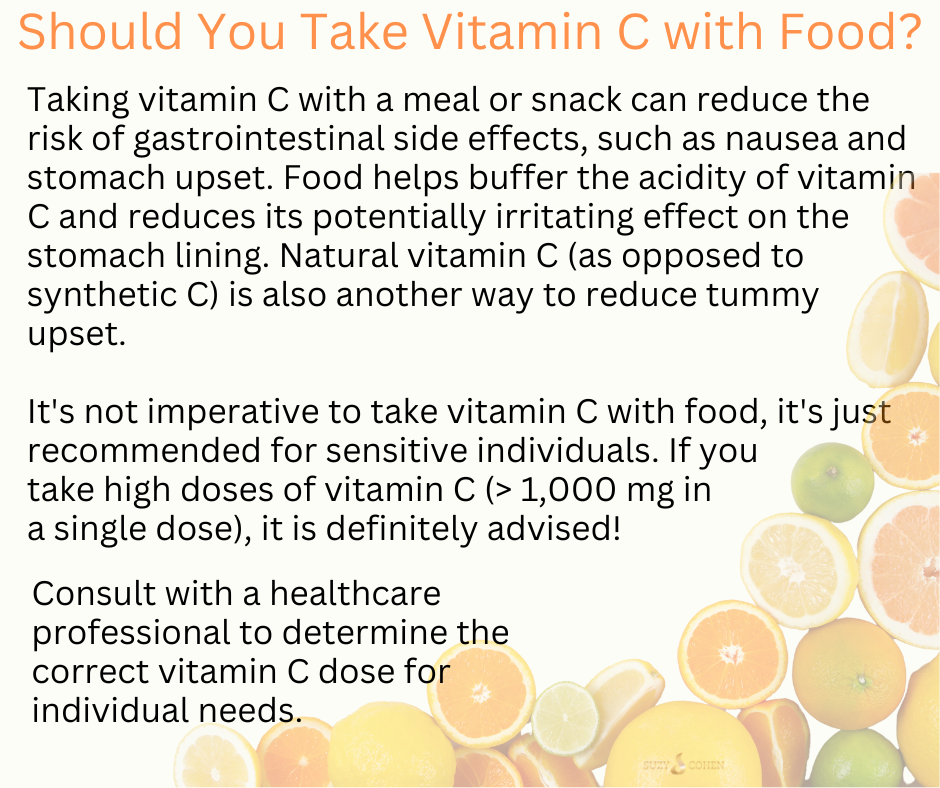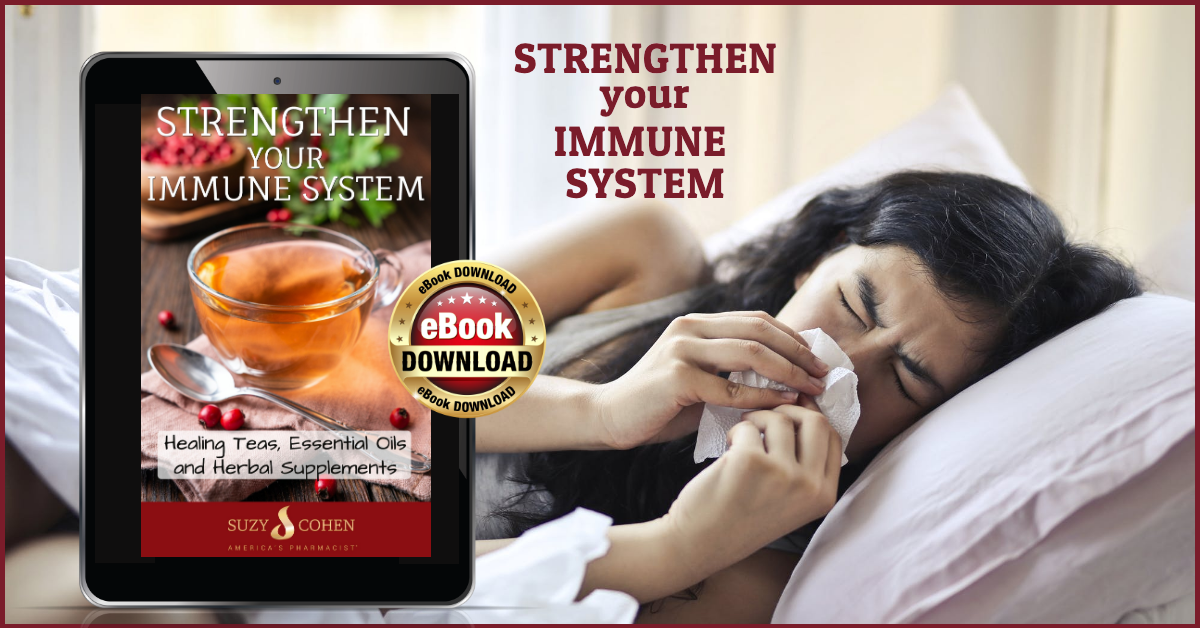What's On This Page?
ToggleVitamin C, also known as ascorbic acid, is a water-soluble vitamin that plays a vital role in various physiological processes in the human body. It is an essential nutrient we cannot synthesize ourselves. We have to obtain it from either our diet or dietary supplements.
Drinking it with orange juice is one way to do it, but you’d have to take a big hit of sugar to consume enough of it each day. On average, an 8-ounce glass of orange juice contains about 124 mg of vitamin C. So, if you want to get 250 mg of vitamin C, you need to drink a whole pint of OJ!
As you know, vitamin C functions as an antioxidant, protecting our body against oxidative stress caused by free radicals which destroy cells. This leads to chronic diseases, such as diabetes, cancer, cardiovascular disease, hypertension, and faster aging (due to a breakdown in collagen).
Think of free radicals as the crumbs and dirt that get scattered around your house. They can come from all sorts of sources – your pets, your kids, or even just normal wear and tear. These crumbs and dirt represent the free radicals, and your house represents your body’s cells.
Now, imagine that antioxidants are like the trusty vacuum cleaner that you use to clean up the mess. As you run the vacuum over the carpet and floors, it sucks up all the dirt and crumbs and leaves everything clean and tidy. In the same way, antioxidants help to neutralize free radicals and clean up the damage they cause to your body’s cells.
We generate free radicals during normal cellular metabolism. That surprises most people because normally you think of free radicals as something you come into contact with. So they are continuously generated by our own body and as long as we have antioxidants around, we can neutralize them.
The trick is to clear them out before they can accumulate or do too much damage to the human body!
Three examples of free radicals produced in the body are:
Superoxide radicals
Hydroxyl radicals
Peroxynitrite
3 Things that Vitamin C Does for You
- Free radical clearance – we’ve discussed that in-depth (see above).
- Enhances iron absorption – when you eat foods rich in iron, the vitamin C present in your body (assuming you have enough because remember you don’t make it) will help you absorb it.
Iron is important for healthy red blood cells and energy which your heart needs 24/7. Without enough iron you will become tired, pale and weak. You could also develop hypothyroidism! I know that sounds so strange but it’s pretty simple.Iron is required to synthize thyroid hormones because of its involvement in the enzyme thyroid peroxidase (TPO). And this TPO enzyme is essential for the “iodination” of tyrosine residues on thyroglobulin, a key step in the production of thyroid hormones (T4 and T3). This metabolic process, known as organification, requires iron as a cofactor. Therefore, without sufficient iron, the activity of TPO is reduced, leading to decreased production of T4 and T3, contributing to the symptoms of hypothyroidism. And again, Vitamin C helps you properly absorb iron out of that roast beef sandwich you’re eating!
- Increases immunity – Vitamin C is known to fight off infections by supporting the production of white blood cells and germ-fighting antibodies. White blood cells (leukocytes) recognize a germ the minute it enters the body. They move towards the site of infection, where they engulf and digest the pathogen through a process called phagocytosis. Other types of white blood cells are present in the body and those produce antibodies that specifically target and neutralize invading microorganisms. White blood cells work together to detect, target, and eliminate harmful germs and pathogens, keeping you healthy and protected.
What are the Symptoms of Vitamin C Deficiency?
A deficiency of vitamin C can lead to scurvy, and numerous problems occur, mainly the lack of collagen production. With that, you might see more fine lines, chronic fatigue, blood vessel microtears (due to endothelial dysfunction), weakness, anemia, and maybe even tender bleeding gums.
Serious signs and symptoms of scurvy are kind of rare these days but it’s definitely possible and may lead to the following issues:
Trouble breathing (because you can’t make enough red blood cells)
Frequent infections
Skin problems like dry/rough skin
Arthritis
Red or blue spots on the skin
Easy bruising
Loose teeth and gingivitis
Anxiety or confusion
Trouble remembering things
Depression
Vitamin C and Blood Vessel Health
It’s not as simple as poor vitamin C intake leads to hypertension, I wish it was. It’s more like poor vitamin C intake leads to poor integrity of the endothelial lining of blood vessels. The endothelium plays a crucial role in regulating blood flow and pressure, and dysfunction of the endothelium is a big risk factor in the development of the cardiovascular disease! Vitamin C has been shown to improve endothelial function by increasing the production of nitric oxide, which is a molecule that helps to widen the blood vessels and improve blood flow.
When this inner (endothelial) lining of blood vessels fails to work well, it causes vasoconstriction and subsequently increases your blood pressure. The collagen that C helps you produce ensures a more elastic blood vessel, and that’s what you want. Without enough collagen, the vessels are not as bendy and it’s this loss of elasticity (and resulting oxidative stress) that causes hypertension – a leading risk factor for heart attack. Studies do confirm this.
Normal blood pressure will change over the years, and the allowances vary a little bit depending on your age, however, for most people you want to shoot for somewhere around 120/80.
Here’s a fun fact about blood pressure: Did you know that giraffes have incredibly high blood pressure compared to humans? In fact, their blood pressure can reach up to 280/180 mmHg, which is more than twice the average human blood pressure!
This is because giraffes have really long necks, so their hearts have to work extra hard to pump blood all the way up to their heads. But they’re generally healthy and rarely experience cardiovascular problems since their blood vessels are very elastic so they don’t rupture or tear.
Next time you see a giraffe at the zoo or watch National Geographic you can impress someone with your knowledge of their ridiculously high blood pressure!
However, hypertension isn’t just about vitamin C. There are other factors that we need to be aware of such as genetics, lifestyle factors (such as a high-salt or junk food diet!), and underlying medical conditions (think diabetes and kidney disease).
These and much more can predispose you to the development of hypertension, and then if you don’t eat enough vitamin C-rich foods, or you don’t supplement, your risk for hypertension goes up. As an additional perk, some studies suggest that vitamin C may have a modest beneficial effect on cholesterol levels.*
There have been many studies on the potential effects of vitamin C (ascorbic acid) on blood pressure. Several studies have shown that vitamin C supplementation can lead to a significant reduction in blood pressure in people with hypertension. For example, a meta-analysis of 29 randomized controlled trials found that vitamin C supplementation led to a modest but statistically significant reduction in both systolic and diastolic blood pressure.
You can certainly take it with a statin drug if your practitioner likes the idea because there’s no bad interaction. The C enhances the effect of the statin’s cholesterol-reducing power. But to answer the question, “Can vitamin C replace statins” the answer is no. It definitely doesn’t reduce cholesterol like the pharmaceutics, but it will contribute to better cardiovascular health if you maintain adequate levels.
What Else Can You Do?
First off, if you have hypertension, you should get a complete workup by your physician, and see a cardiologist. They will want to do some blood work, track your BPs, order a urinalysis and probably an ECG (electrocardiogram). This last test measures the electrical activity of your heart to check for any abnormalities. It’s quick and painless, but can be a bit nerve-wracking if you’re not used to having wires stuck to your chest.
Ambulatory blood pressure monitoring: If your doctor wants to get a more accurate picture of your blood pressure throughout the day and night, they might order an ambulatory blood pressure monitor. This involves wearing a device that takes your blood pressure at regular intervals over a 24-hour period. You’ll be the coolest kid on the block with that thing strapped to your arm!
So, there you have it. While these tests might not be the most exciting way to spend your day, they can help your doctor get a better understanding of your blood pressure and determine the best course of treatment.
As for C, it’s pretty easy. It’s important to get adequate levels of vitamin C through your diet, as it is an essential nutrient that plays a crucial role in numerous physiological processes in the body. It’s so easy to eat C because it’s in leafy greens, strawberries, citrus fruits, and juices, kiwis, and peppers.
What About Supplementation
The truth is that synthetic ascorbic acid will give you vitamin C – it’s made in a laboratory and derived from corn usually. It’s not bad, it’s just that some people think that all those supplements are made by squeezing oranges, and that’s just not true. I’ve been referring to ascorbic acid supplements. But there are some 100% natural vitamin C brands that are produced by extracting the nutrient/flavonoids from actual fruits like cherries, lemons, oranges and grapefruits.
You can see my brand HERE if you need some C or want to upgrade your current brand.
Sometimes people wonder if cherries really have that much C.
Acerola cherries are a specific type of cherry used in dietary supplements, and they are a clean, excellent source of vitamin C. In fact, they are one of the richest natural sources of this nutrient, with up to 100 times more vitamin C per serving than oranges! Vitamin C derived from food and that ascorbic acid are chemically identical, but they may not be exactly the same in terms of how the body processes and absorbs them.
Again, details matter and ascorbic acid is a synthetic form of vitamin C that is commonly used in dietary supplements and fortified foods. It is chemically identical to the vitamin C found in natural food sources such as fruits and vegetables.
However, vitamin C from natural food sources and natural dietary supplements have additional nutrients and phytochemicals that can enhance its absorption and utilization by your body. For example, citrus fruits contain bioflavonoids, which are plant compounds that have antioxidant properties and may help to increase the bioavailability of vitamin C. It’s easier on the tummy too.

Other Considerations for Healthy Arteries and Blood Vessels
In addition to vitamin C, there are several other vitamins/minerals that may help to support healthy blood pressure levels. Of course, you should ask your doctor what’s right for you. This is strictly educational.
Vitamin D: Vitamin D is essential for maintaining strong bones and teeth, but it may also play a role in regulating blood pressure. Several studies have shown that people with low levels of vitamin D are more likely to have high blood pressure. Vitamin D may help to improve blood vessel function and reduce inflammation, which can contribute to high blood pressure.
Magnesium: Magnesium is a mineral that is essential for many physiological processes in the body, including blood pressure regulation. It helps to relax the blood vessels and improve blood flow, which can help to lower blood pressure. Studies have shown that magnesium supplementation can lead to a modest reduction in blood pressure in people with hypertension. Do you already take supplements of this mineral? If so, are you sure you’re taking the right type of magnesium because some of the most popular brands do not leave the gut?! READ THIS.
Potassium: Potassium is another mineral that is important for maintaining healthy blood pressure. It helps to balance the levels of sodium in the body, which can affect blood pressure. Potassium also helps to relax the blood vessels and improve blood flow. Foods that are high in potassium include bananas, sweet potatoes, spinach, and avocado.
Vitamin B-12: Vitamin B-12 is important for maintaining healthy nerve cells and red blood cells, but it may also have a role in blood pressure regulation. Several studies have shown that people with low levels of vitamin B-12 are more likely to have high blood pressure. Vitamin B-12 may help to reduce homocysteine levels in the blood, which can contribute to hypertension. You might be interested in my other article, Why You Should Think Twice Before Buying B Complex Vitamins.
Overall, a healthy diet that includes a variety of nutrient-dense foods is the best way to ensure that you are getting all of the vitamins and minerals that you need to maintain healthy blood pressure levels. If you are concerned about your blood pressure, don’t treat it with remedies, see an actual doctor for proper care.
What’s a Limey?
This is interesting, did you know that sailors went on long voyages in the 18th century and used to take limes with them to keep from developing symptoms of scurvy?
In 1747, a Scottish physician named James Lind conducted an experiment in which he gave different groups of sailors various remedies for scurvy, including citrus fruits like oranges and lemons. He found that the sailors who ate the citrus fruits recovered from scurvy much more quickly than those who didn’t. Lind’s experimentation led to the widespread practice of taking limes (which were more readily available in British colonies) on long sea voyages in an effort to prevent scurvy. That’s how sailors became known as “limeys.”
⚠️Caution for Vitamin C
It’s a fairly innocuous nutrient, but I’d advise that you ask your physician about it if you take certain medications like antibiotics like tetracycline or erythromycin. Also, another main concern is that high doses of vitamin C may interfere with the absorption and effectiveness of chemotherapy drugs, reducing their effectiveness.
In addition, high oral doses of vitamin C over a long period of time may increase the risk of kidney stones in people with a history of this condition. This is because vitamin C is metabolized in the body to oxalate, which can contribute to the formation of calcium oxalate kidney stones.
Finally, vitamin C supplements may interact with blood-thinning medications, such as warfarin, by increasing the risk of bleeding. This is because vitamin C can enhance the effects of these medications and interfere with blood clotting.
Overall, while vitamin C is generally safe and well-tolerated, it is important to be mindful of potential drug interactions when taking supplements or high doses of it (given orally or IV).
Summary
In summary, vitamin C helps to maintain the health and function of arteries and blood vessels by promoting the production of collagen, acting as an antioxidant to prevent damage, and improving endothelial function to regulate blood flow and pressure.
Several studies have shown that vitamin C supplementation may lead to a modest reduction in blood pressure in people with hypertension, but it certainly won’t work as well as Norvasc!
Regardless, one possible mechanism by which vitamin C may lower blood pressure is through its antioxidant properties, which help to protect the blood vessels from damage and improve their function. In addition, vitamin C has been shown to improve the production of nitric oxide, which helps to dilate (widen) the blood vessels and improve blood flow.
While the evidence for vitamin C’s effects on blood pressure is not conclusive, incorporating foods rich in vitamin C into your diet can help support overall health and well-being.

Suzy Cohen, has been a licensed pharmacist for over 30 years and believes the best approach to chronic illness is a combination of natural medicine and conventional. She founded her own dietary supplement company specializing in custom-formulas, some of which have patents. With a special focus on functional medicine, thyroid health and drug nutrient depletion, Suzy is the author of several related books including Thyroid Healthy, Drug Muggers, Diabetes Without Drugs, and a nationally syndicated column.


